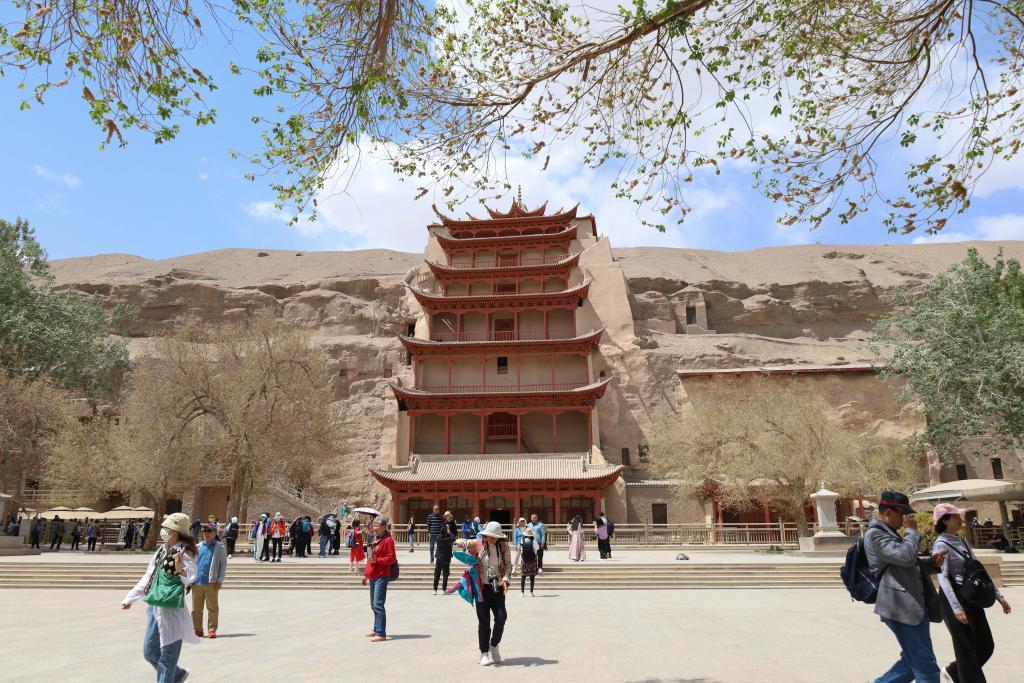

Tourists visit the Mogao Grottoes in Dunhuang, northwest China's Gansu Province, May 11, 2023. (Xinhua/Ma Xiping)
I had come to Dunhuang expecting to marvel
During my recent trip to Dunhuang City, northwestern China's Gansu Province, I visited the Mingshashan and the Crescent Lake, an oasis scenic spot in the Gobi Desert. As twilight settled, I joined throngs of visitors climbing the soft, warm sands, reaching a vantage point overlooking the shimmering Crescent Spring.
As night fell, the desert came alive with music played by a DJ at the foot of the dune. Thousands of voices joined together in song, with a delightful mix of soulful melodies and upbeat tunes. Cell phone flashlights waved in unison, creating a sea of twinkling lights across the dunes.
Javier Garcia, a journalist from Spain, was surrounded by dozens of young students from Renmin University of China who had travelled from Beijing to Dunhuang on a school trip.
"Even though I couldn't understand the lyrics, I found myself swept up in the joyous atmosphere," Garcia said as he joined the students swaying to the rhythm.
This "concert under the stars" is a relatively new attraction. Launched in the summer of 2023, it is one of Dunhuang's endeavors to diversify tourism offerings beyond culture, art and natural landscape sightseeing.
Throughout the peak tourist season from June to mid-October, visitors can experience this nightly spectacle. Lyrics are projected onto the dunes, while drones form intricate shapes in the sky -- sometimes depicting the famous "flying apsaras" of Dunhuang art, other times portraying the iconic nine-story building of the Mogao Grottoes. On special nights, fireworks illuminate the desert landscape.
Lin Haofei, a student from Renmin University of China, said that he loved the concept of the concert because it transforms everyone into a performer. This, he believes, creates a strong sense of connection between the city and its visitors.
The concert wasn't the only modern tourism twist the ancient city had in store. During my stay, I encountered many people adorned in flowing, colorful costumes and delicate makeup, posing gracefully with tourist attractions as a backdrop. It is part of the booming "travel photography" trend sweeping China.
Eager to join in, I visited one of the many costume rental shops that have sprung up to cater to this craze.
Located in Dunhuang downtown, Wei Ying's shop offers over 50 sets of clothing and hires two stylists and two photographers. Since the start of the peak tourist season, it serves around five customers each day.
"Many people, mostly young women, come to us after seeing trending posts about Dunhuang travel photography on social media. I even had two foreign customers this week," Wei told me.
Amid the rising popularity of educational travel across China, Dunhuang, with its rich historical relics and intangible cultural heritage, has emerged as a hot destination for study tour groups.
For younger visitors, tourist attractions have developed specialized programs that provide them with in-depth explorations of the city's culture and art.
When I visited Mogaoli Craftsman Village in Dunhuang, a base for traditional Dunhuang crafts education, a group of middle school students from the southwestern province of Sichuan had just finished their tour. The students participated in hands-on workshops to learn about the crafts involved in creating grotto art.
Sculpture artist Du Yongwei, the founder of the village, expressed his delight that young people can learn about and immerse themselves in Dunhuang's culture and art.
As my two-day journey in Dunhuang was coming to an end, I suddenly recalled a slogan I had seen on a roadside billboard upon entering the city: Dunhuang, a place that appeals to all hearts.
It is truly a place with timeless charm. For centuries, Dunhuang has enchanted travelers as a vital link between cultures. Today, it continues to captivate hearts with a vibrant, multifaceted experience that brings history to life in unexpected and delightful ways.
